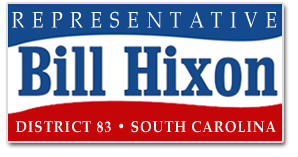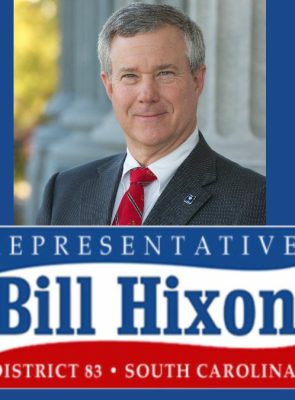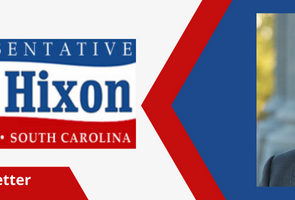HOUSE WEEK IN REVIEW
The House of Representatives amended, approved, and sent the Senate H.3247, a bill making comprehensive statutory revisions regarding MOPEDS. The legislation establishes new requirements for registering and licensing mopeds with the Department of Motor Vehicles. New safety requirements are established for mopeds including requirements for moped operators and passengers to wear reflective vests at night. The legislation provides that it is unlawful for a person to operate a moped on the public roads in this state that have a speed limit
 of greater than fifty-five miles per hour. A moped, while traveling along a multi-lane highway, must be operated in the farthest right lane except when making a left turn. No person may operate a moped at a speed in excess of thirty-five miles an hour. As with motorcycles, a person under the age of twenty-one may not operate or ride upon a moped unless he wears a protective helmet. Mopeds are exempted from ignition interlock device requirements of driving under the influence provisions. Those who sell mopeds are required to post signs that provide brief explanations of such matters as age restrictions, maximum speeds, and the definition of a moped. A moped seller is not required to obtain a motor vehicle dealer's license. The legislation replaces the multiple, sometimes conflicting, definitions for mopeds currently found in statutes with a single new definition for mopeds and makes other revisions to allow for greater consistency in the way that the laws governing motor vehicles, including DUI offenses, are applied to mopeds.
of greater than fifty-five miles per hour. A moped, while traveling along a multi-lane highway, must be operated in the farthest right lane except when making a left turn. No person may operate a moped at a speed in excess of thirty-five miles an hour. As with motorcycles, a person under the age of twenty-one may not operate or ride upon a moped unless he wears a protective helmet. Mopeds are exempted from ignition interlock device requirements of driving under the influence provisions. Those who sell mopeds are required to post signs that provide brief explanations of such matters as age restrictions, maximum speeds, and the definition of a moped. A moped seller is not required to obtain a motor vehicle dealer's license. The legislation replaces the multiple, sometimes conflicting, definitions for mopeds currently found in statutes with a single new definition for mopeds and makes other revisions to allow for greater consistency in the way that the laws governing motor vehicles, including DUI offenses, are applied to mopeds.
 The House amended, approved, and sent the Senate H.3587, a joint resolution creating a temporary SEIZURE SAFETY IN SCHOOLS STUDY COMMITTEE to examine such issues as: the state of epilepsy awareness among public school teachers, staff, and administrators; basic training in seizure response appropriate for school personnel; and, existing laws, regulations, and policies affecting epilepsy and seizure safety in public schools. The legislation provides for the composition of the fourteen-member committee, four of whom are legislative representatives with the others representing the medical, education and parent communities. Recommendations must be reported to the General Assembly before January 31, 2018, at which point the study committee is dissolved.
The House amended, approved, and sent the Senate H.3587, a joint resolution creating a temporary SEIZURE SAFETY IN SCHOOLS STUDY COMMITTEE to examine such issues as: the state of epilepsy awareness among public school teachers, staff, and administrators; basic training in seizure response appropriate for school personnel; and, existing laws, regulations, and policies affecting epilepsy and seizure safety in public schools. The legislation provides for the composition of the fourteen-member committee, four of whom are legislative representatives with the others representing the medical, education and parent communities. Recommendations must be reported to the General Assembly before January 31, 2018, at which point the study committee is dissolved. legislation revises provisions for MINORS OBTAINING BEGINNER'S PERMITS OR DRIVERS' LICENSES UNDER THE AUTHORIZATION OF RESPONSIBLE ADULTS who are willing to assume the obligation imposed for the licenses or permits. In an effort to ease and normalize the procedures for adults sponsoring minors under their care for permits and licenses, the legislation expands the list of those who may sign the application for a beginner's permit or driver's license of an unemancipated minor so that it includes not only mothers, fathers, legal guardians, and adults willing to assume responsibility for the minor, but also specifically references such individuals as stepparents, individuals who have custody, care, and control of the minor, as well as foster parents, pre-adoptive parents, or persons responsible for the welfare of the child who resides in a child caring facility or residential group care home, upon written approval by the Department of Social Services. The legislation includes provisions for obtaining beginner's permits and driver's licenses when DSS has guardianship or legal custody of the minor. The disclosure of information by DSS to the Department of Motor Vehicles in order to provide approval is not to be considered an unlawful dissemination of confidential information.
legislation revises provisions for MINORS OBTAINING BEGINNER'S PERMITS OR DRIVERS' LICENSES UNDER THE AUTHORIZATION OF RESPONSIBLE ADULTS who are willing to assume the obligation imposed for the licenses or permits. In an effort to ease and normalize the procedures for adults sponsoring minors under their care for permits and licenses, the legislation expands the list of those who may sign the application for a beginner's permit or driver's license of an unemancipated minor so that it includes not only mothers, fathers, legal guardians, and adults willing to assume responsibility for the minor, but also specifically references such individuals as stepparents, individuals who have custody, care, and control of the minor, as well as foster parents, pre-adoptive parents, or persons responsible for the welfare of the child who resides in a child caring facility or residential group care home, upon written approval by the Department of Social Services. The legislation includes provisions for obtaining beginner's permits and driver's licenses when DSS has guardianship or legal custody of the minor. The disclosure of information by DSS to the Department of Motor Vehicles in order to provide approval is not to be considered an unlawful dissemination of confidential information.
- South Carolina has grown.
- In 1990, population was 3.5 million
- Resident population grew 15% from 1990-2000, and another 15% from 200-2010
- Projected increase of 8.5% from 2010-2020, and by 2030 , projected to have a population of 5.1 million, representing a 28.3% increase since 2000
- Per capita income in SC in 1987 was $13,055; by 2015 it had more than doubled to $38,302
- In 1990, population was 3.5 million
- SC's road system has grown and its needs have, too.
- SC fourth-largest state road system in the country, even though we are ranked 24th in population and 40th in land area
- Since 1987,the state System has increased by 7,425 lane miles (83,173 to 90,598)
- These additional lane miles can be the result of capacity projects that add extra lanes to existing roads, but can also be the result of newly-constructed roads (often from local MPO/COG projects)
- Capacity needs continue to grow as population increases, and maintenance needs also grow accordingly
- According to LAC report, of all states, SC dedicates the smallest amount of revenue to state roads relative to the size of the system and amount of traffic it carries
- Road funding has NOT kept pace with growth.
- SC motor fuel user fee has not been increased since 1987, putting us at a disadvantage compared to neighboring States
- LAC report states that "revenue sources are not increasing enough to cover rising costs due to inflation" ($1 in 1987 = $0.47 today) – If revenues aren't even keeping pace with inflation, they certainly can't keep pace with the state's growth and the additional stress it puts on our roads
- SCDOT has been living on a fixed income since 1987–even as the number of SCDOT employees has decreased by nearly 10% since 1994, employer costs have more than doubled due to increases implemented by the General Assembly, and cost of materials has increased
- Of the 16.75 Motor Fuel User Fee, there is less than ONE CENT left to fund state system needs after required transfers to other entities,
matching money for federal highway dollars, and daily highway maintenance costs [See chart below]
- We have implemented significant reforms to SCDOT, with further improvements in H. 3516.
-
- Act 114 of 2007
- Governance – Clarified SCDOT Commission selection process and instituted term limits for Commissioners
Project Prioritization – Established a requirement to evaluate, prioritize, and select projects based on set criteria, bringing a greater deal of objectivity and transparency to the project selection process; these IiSt5 can viewed on the SCDOT website today
Auditing – E5tablished a Chief Internal Auditor under the Commission and required two hours of ethics training every other year for all staff and Commissioners
- Governance – Clarified SCDOT Commission selection process and instituted term limits for Commissioners
- Act 275 of 2016
- Governance- Allowed Governor to appoint all Commissioners with advice and consent of Legislative delegations and provided additional term limits for Commissioners
Lines of Authority – Required all Infrastructure Bank projects to be ranked according to Act 114 criteria and receive SCDOT Commission approval
Auditing – Moved the SCDOT Chief Internal Auditor under the State Auditor for increased accountability
- Governance- Allowed Governor to appoint all Commissioners with advice and consent of Legislative delegations and provided additional term limits for Commissioners
- Reform proposed in H. 3516
- Governance- – Streamlines appointment process by allowing the Governor to appoint Commissioners with advice and consent of the General Assembly, eliminates the Joint Transportation Review Committee, and allows the Commission to appoint the Secretary Financial – Establishes the Infrastructure Maintenance Trust Fund at the SCDOT, which may only be used for "repairs, maintenance, and improvements to the existing road system" and directs all new revenue raised by H. 3516 to be deposited into this fund
- Act 114 of 2007
- SCDOT needs an additional 51.1 B per year for 23 years ($25.3 B) to bring all existing pavements to a state of good repair
- As the state grows, additional investment will be required to address capacity improvements like widening and expansion to relieve congestion and aid in freight mobility
- The State has poured hundreds of millions of general fund dollars into our roads since 2014–this is unsustainable in light of other statewide needs such as unfunded pension liability and rising education and healthcare costs
- If we do not increase the dedicated revenue provided to SCDOT through the Motor Fuel User Fee and other non-general fund sources, our roads continue to decline
- The cost of inaction–as roads continue to decline, the cost to repair them increases at least $385 M each year

* Establishes an Infrastructure Maintenance Fee (1 time 5%) must be paid prior to registration
* $500 cap applied to vehicles purchased in SC – collected by dealers at point of sale
* $250 cap applied to vehicles registered in other states & then registered in SC
* Active Duty Military, Spouses and Dependents are exempt from the $250 transfer fee
* Collected by SCDMV upon initial registration – $20 M/year in previously uncaptured revenue
* All new revenue deposited into Infrastructure Maintenance Trust Fund
* $90 M/year in total new revenue from the Infrastructure Maintenance Fee
* Effective date – July 1, 2017
* EIA is held harmless with no changes to current revenue (20% of revenues from first $300)
Hybrid and Electric Vehicles
* Biennial Fee
* $60 fee for Hybrids – $120 fee for Electric Vehicles – $1.35 M/year
* All new revenue deposited into Infrastructure Maintenance Trust Fund
* Effective date – January 1, 2018
Motor Carrier Road Use Fee
* Imposed in lieu of property taxes on Large Commercial Vehicles
* Captures previously uncollected revenue from out-of-state motor carriers
* Based on fair market value, average statewide millage rate, assessment ratio of 9.5%, and portion of miles driven in SC compared to total miles driven
* Holds counties harmless – maintains existing distribution formula for collected amount
* New revenue from out of state truckers – $9 M/year – Infrastructure Maintenance Trust Fund
* Effective date – January 1, 2019
RFA Fiscal Impact Statement Revenue Estimates (updated 2/27/17)
Year 1 – FY 2017-2018 – $177 M to SCDOT
Year 2 – FY 2018-2019 – $258 M to SCDOT – $13 M increase to C-Fund
Year 3 – FY 2019-2020 – $339 M to SCDOT – $26 M increase to C-Fund
Year 4 – FY 2020-2021 – $408 M to SCDOT – $40 M increase to C-Fund
Year 5 – FY 2021-2022 – $479 M to SCDOT – $53 M increase to C-Fund



